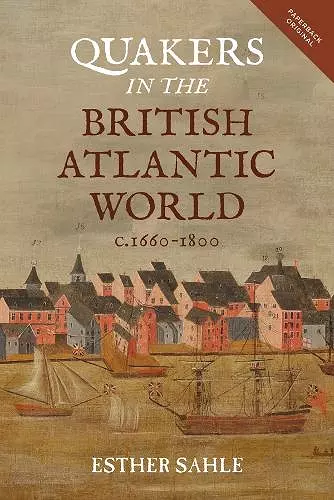Quakers in the British Atlantic World, c.1660-1800
Format:Paperback
Publisher:Boydell & Brewer Ltd
Published:21st May '21
Should be back in stock very soon

Examines the two largest Quaker communities in the early modern British Atlantic World, and scrutinizes the role of Quaker merchants and the business ethics they followed. The book studies the two largest Quaker communities in the early modern British Atlantic World, London and Philadelphia. It looks at the origins of the Society of Friends in mid seventeenth century England and follows its development into a well organised sect with a sophisticated organisational structure spreading across the Atlantic world. The book zooms in on the Quaker communities in these two important port cities, as well as their relationships with non-Quaker inhabitants. It scrutinizes the role of Quaker merchants and the business ethics they followed. Drawing on many unpublished sources, the study is able to portray a mid-eighteenth-century crisis for the Quaker communities when sanctions for offences against the prevailing disciplines in business (fraud, debt, bankruptcy) and marriage increased dramatically. And yet these Quaker communities got likewise caught up in wider political developments across the British Empire. In the course of a series of conflicts affecting colonial Pennsylvania in the mid eighteenth century, the Society of Friends suffered grave reputational damage. The public in England and Pennsylvania began to perceive Quakers as a sect that put its own agenda and interest over the welfare of the colonial population and the Empire. In turn, these developments led to a "Quaker reformation" and Quaker identity became guided by new principles: honesty in business and religious marital endogamy. The book will be of interest to scholars and students of economic and Atlantic history, as well as Eighteenth-Century studies and religious history.
Esther Sahle's book is ground-breaking and troubling in equal measure. It offers all scholars, and particularly those of early modern religion, business, or social history, insights into business, religious, and family networks and their role as powerful, interwoven structures which enabled a small group to have a disproportionate degree of economic power. [...] This is a very significant study and Sahle will no doubt continue to undertake more, equally significant, research in years to come. * CULTURAL AND SOCIAL HISTORY *
Important for pushing historians of the movement to look beyond sectarian divisions and fully embed the history of Quakerism within larger cultural trends and economic developments. The rich empirical analysis of Sahle's study, especially the wealth of information it provides about the nature and impact of early Quaker codes of discipline, will serve as an important source of reference for future historical research. * JOURNAL OF BRITISH STUDIES *
Esther Sahle's book is an insightful analysis of seventeenth- and eighteenth-century Quaker communities in London and Philadelphia, especially Quaker merchants within those communities. -- H-NET REVIEWS
Sahle takes up an old question: Why did Quakers in England and America prosper, in some cases amassing great wealth? . . . [Sahle] finds that . . . [Quakers] refused to tolerate anything that smacked of questionable business practices and whose moral standing was restored. Recommended. * CHOICE *
ISBN: 9781783275861
Dimensions: unknown
Weight: 342g
218 pages